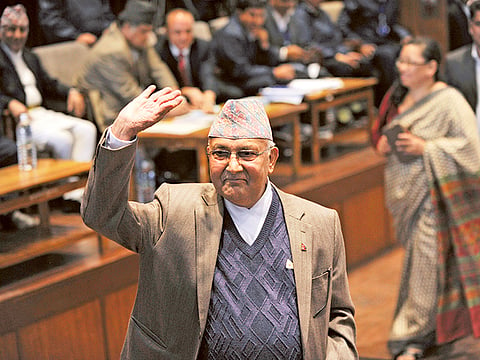Ousted Nepal PM Oli reappointed
KP Sharma Oli, 69, had lost a no-confidence vote on Monday

Kathmandu: Nepal's ousted prime minister has been reappointed after the political opposition failed to secure the majority of lawmakers' support.
KP Sharma Oli, 69, had lost a no-confidence vote on Monday following months of feuding within his ruling Nepal Communist Party and coalition partners.
But after the president called on parties to propose a new candidate by Thursday evening, the opposition Nepali Congress found it was unable to cobble together a majority coalition.
Oli, the leader of the biggest party in parliament, was reinstated.
"Respected President Bidya Devi Bhandari has appointed KP Sharma Oli... as the prime minister," a statement from the president's office said.
This latest instalment of political turmoil in Nepal comes as the Himalayan country reels from the coronavirus pandemic, with acute shortages of oxygen and hospital beds.
Daily cases have risen 60-fold since April 1 and nearly one thousand people have died in the past 10 days, according to official figures, which are widely seen as under-reporting the true scale of the crisis.
The Nepal Medical Association has called on politicians to "postpone their political calculations" and prioritise saving lives.
For months, Oli has faced fierce criticism over his handling of the pandemic, as well as corruption allegations and political infighting over party leadership.
He was appointed prime minister in 2018 and secured a two-thirds majority of parliament through a merger between his party, the CPN-UML, and the former rebels' Communist Party of Nepal (Maoist Centre).
The alliance fueled hopes that a majority government would bring stability and much-needed development to a nation left devastated by a 2015 earthquake.
Instead, Oli created fresh political chaos when he dismissed the legislature in December, accusing members of his own party of noncooperation, and called for a new election.
Two months later, the Supreme Court reinstated parliament. Another ruling split the Nepal Communist Party back into two.
Nepal has enjoyed relative peace since 2006, when a decade-long civil war ended and most rebels joined mainstream politics.









